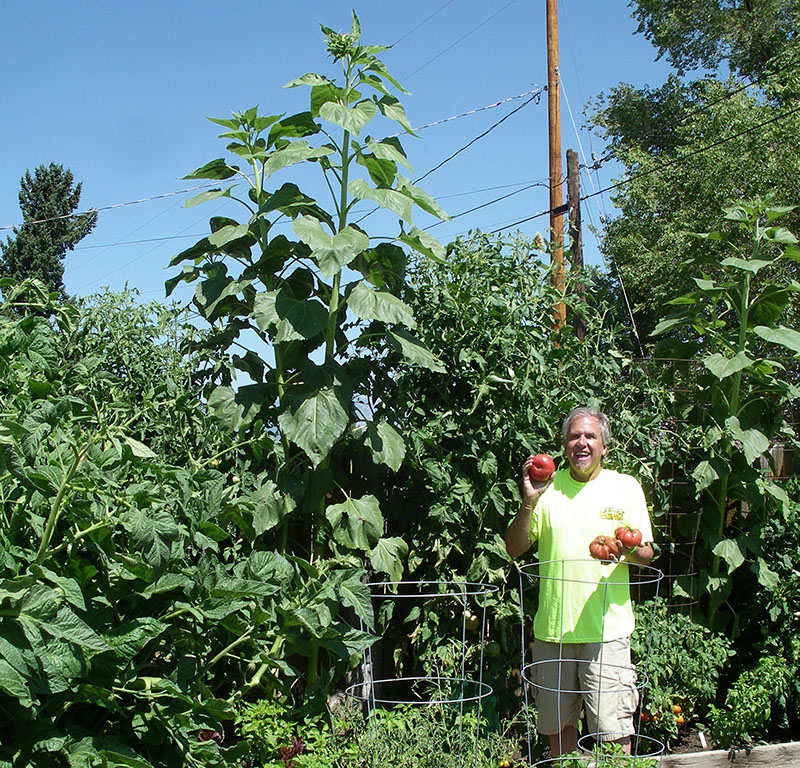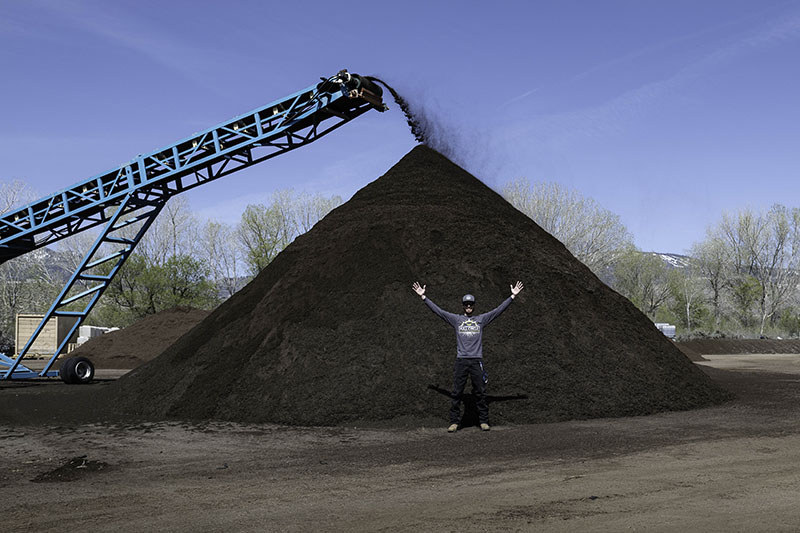Three steps to soil health this summer.
In 1892, the Witt family started dairy farming in Minden. A fifth-generation Nevadan, Cody Witt, co-owner and manager of Full Circle Compost in Minden, learned about soil health from his predecessors’ trial and error on the family ranch. Today, his compost company is a leader in the state’s regenerative agriculture industry and celebrated for its soil savvy.
Witt says there are three basic steps to achieving healthy, well-balanced soil this planting season, which in turn yields nutrient-dense growth. He explains that Nevada’s high-desert soil is deficient in most nutrients; it’s simply dirt — soil with no organic matter or life present. So it needs amendment before gardening with it.
By the 1980s, Cody’s father, Craig, was researching the benefits of regenerative agriculture and began making compost for the family ranch versus continuing with conventional methods using fertilizer and pesticides. Aside from raising dairy cows, the Witt family’s Milky Way Dairy Farm grew alfalfa and other crops for cattle feed. Over the years, Craig noticed decreased crop production after applying manure and chemical-based fertilizers, and the dairy cows weren’t producing as much milk.
Craig embarked on a scientific journey to better understand Nevada’s soils, with a goal of increased crop production and nutrient density in their animal feeds. He blended manure with carbon and researched mined minerals and Nevada’s soil nutrients to develop a nutritionally balanced, quality soil product. His soil and compost products resulted in Milky Way Dairy Farm’s herds boasting the highest lactation rate in the state, proving his efforts were fruitful.

A desire to proliferate his newly developed products to improve other Nevada farms, ranches, and even backyard gardens then turned into a family business: Full Circle Soils & Compost.
In 2018, Full Circle added a new partner and co-owner, high-volume composting expert Dane Buk, to the business, and the company is now the largest organics recycler — a closed loop system of collecting then recycling organic matter — in Northern Nevada. In 2023 alone, it kept 69,200 cubic yards of organic materials out of landfills — enough to fill the University of Nevada, Reno’s Mackay Stadium 32 feet high.
Step 1: Soil Testing
With Northern Nevada’s notoriously nutrient-deficient soil, Cody says the first step toward garden health is getting a soil test.
“In different parts of the country, where you have a much more fertile and water-heavy environment, you have soil structures that are much better for overall growing; in the desert, what we have is just dirt,” he says. “We explain dirt as soil that has no organic matter and no life, and life is biology. Why there’s no life is because most of Nevada only grows sagebrush, so you don’t get the decomposition.”
In Lake Tahoe, for example, pine needles will fall and over time mulch and create what most people call topsoil. This is Mother Nature’s version of compost. She fertilizes herself.
But with no vegetation in Nevada’s deserts, the decomposition that, over years, improves soil health naturally doesn’t occur. So amendments are needed. Discovering which nutrients to add starts with a simple soil test to analyze the existing nutrients in the soil.
Full Circle Soils & Compost can walk people through doing their own testing; provide information on how to send the sample to a trusted, affordable laboratory that will give test results; then analyze the results and provide guidance on how to amend the soil for the best gardening results, all for free. You don’t want to add anything to the soil until you know what already exists there or is lacking.
Step 2: Amending the Soil
Full Circle sells a multitude of garden-ready products based on identifying the most commonly needed nutrients in Nevada soils through extensive testing and research, and its staff creates custom blends. Cody says that when armed with the test results, gardeners also can head to their local nurseries and ask questions.
Share what you plan to plant and provide the soil results, so their experts can assist you. Cody also warns against adding too much manure, which can throw the soil health out of whack, versus supplementing with appropriate, quality amendments.
Step 3: Imitating Mother Nature
A plant’s nutrient density directly correlates to that of the soil from which it came. If you add only chemical fertilizers, it’s like a bodybuilder on steroids. The plant might see quick results, but remove the steroids and the bodybuilder’s size will decrease.
So, Cody says, getting soil back to what nature intended is vital, often requiring a “soil buffet.” You want to start from the ground up with a full spectrum of soil nourishment to grow the most nutritious produce.
“If things are growing well, let it grow,” he says. “But if things are not growing well, then understand why … [There are] so many factors in gardening, a lot of people water incorrectly … They might even have the nutrition, but they might not know how to water.”
Want to learn how to water and garden correctly in the high desert? Visit Full Circle’s website for a free, 19-page Nevada Grower’s Guide e-book and other resources, including a blog and videos. An internet search also can provide tips.
Compost made from quality organic matter is key. Nevada typically has only 1 percent organic matter in its soil. For each percent the organic matter in soil is raised, about 27,000 gallons of water per acre are saved, says the United States Department of Agriculture’s National Resources Conservation Service.
The amendment order also is important. Full Circle’s team is not a fan of what it calls the “lasagna method” of layering soil; when cardboard or raw wood chips are placed on top, Nevada’s arid climate will take forever to break them down.
Cody explains that Nevada soils have the digestive capacity of a baby with no teeth. Native Nevada soils need to slowly be fed biologics to properly absorb the nutrients, which is why composting is ideal. The composting process breaks down biological matter so it’s easier for the soil to absorb.
He suggests doing a one-time till to combine compost with the correct mineral and nutrient mixture for your soil, getting it about six to eight inches deep. The goal is not to till your garden any further after the initial process. Once the soil is ready, further tilling can destroy any newly established roots, break up soil that doesn’t want to move, and disturb its newly balanced biology, plus damage any helpful worms that are present.
Nature builds organic matter from the top down, creating a necessary carbon sink. If soil needs to be broken up, Cody suggests gently wiggling a spade into the dirt but not flipping the soil over, as it will disrupt the stasis you just worked so hard to achieve.
It’s now time to move to mulching. One to two inches of mulch (composted is preferred) should go on top of the tilled soil to protect it from the sun, increase its water-holding capacity, and eventually turn into nutritious, organic matter.
“The whole point of this is that you’re increasing the nutrient density of your food by looking at a holistic, sustainable approach to soil fertility, and then the results are real,” Cody says. “You can grow big in Nevada. We average 100 pounds of tomatoes per plant in a four-month growing season in Carson City.”
Full Circle Soils & Compost
775-267-5305 · Fullcirclecompost.com


